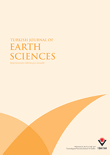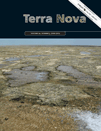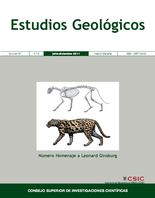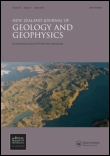
TURKISH JOURNAL OF EARTH SCIENCES
Scope & Guideline
Elevating Earth Science Research to New Heights
Introduction
Aims and Scopes
- Tectonics and Geodynamics:
The journal frequently publishes research on tectonic processes, including fault mechanics, seismicity, and the geodynamic evolution of different regions, particularly in Turkey and surrounding areas. - Sedimentology and Stratigraphy:
Research on sedimentary processes, facies analysis, and stratigraphic frameworks is a core focus, highlighting depositional environments and geological history. - Geochemistry and Petrology:
The journal features studies that investigate the chemical composition and mineralogical characteristics of rocks, contributing to understanding petrogenesis and geological histories. - Geoenvironmental Studies:
There is an increasing emphasis on the interactions between geological processes and environmental issues, including groundwater studies, geothermal energy, and the impact of natural disasters. - Geophysical Investigations:
Research utilizing geophysical methods to study subsurface structures, seismic activity, and geological hazards is well represented, with applications in both academic and practical contexts. - Paleontology and Micropaleontology:
The journal includes studies on fossil records and microfossils, which provide insights into past environmental conditions and biostratigraphy.
Trending and Emerging
- Natural Hazards and Risk Assessment:
Research focusing on natural hazards, particularly seismic events and their impacts, has surged, driven by the need for better risk assessment and disaster preparedness in regions prone to earthquakes. - Geothermal Energy and Sustainability:
As interest in renewable energy sources grows, there is an increasing number of studies related to geothermal energy, including exploration, resource management, and environmental impacts. - Climate Change and Environmental Geoscience:
The journal has embraced studies addressing the impacts of climate change on geological processes and ecosystems, reflecting a broader societal focus on environmental challenges. - Advanced Geophysical Techniques:
Emerging technologies in geophysics, such as machine learning applications and enhanced remote sensing techniques, are becoming more prevalent, showcasing the journal's commitment to innovative methodologies. - Geo-information Systems (GIS) Applications:
The integration of GIS and spatial analysis in geological studies is on the rise, reflecting the growing importance of data-driven approaches in understanding complex geological phenomena.
Declining or Waning
- Hydrocarbon Exploration and Production:
There appears to be a reduced emphasis on research specifically targeting hydrocarbon exploration and production techniques, possibly due to changing energy priorities and a shift towards renewable energy sources. - Historical Geology:
Although historical geology remains relevant, studies focusing solely on ancient geological formations without contemporary implications are becoming less common in favor of more applied research. - Traditional Mineralogy:
Research centered on classical mineralogical studies, such as descriptive mineralogy without modern analytical techniques, has decreased, as the field moves towards more interdisciplinary approaches. - Geological Mapping:
While geological mapping is foundational, the frequency of studies that solely focus on traditional geological mapping without integrating modern geospatial technologies has waned.
Similar Journals

Environmental Earth Sciences
Advancing knowledge for a sustainable Earth.Environmental Earth Sciences is a prestigious journal published by Springer, dedicated to advancing knowledge in the multifaceted fields of Earth Sciences, including Earth-Surface Processes, Environmental Chemistry, Geology, and Soil Science. With an ISSN of 1866-6280 and an E-ISSN of 1866-6299, this journal occupies a notable position in the academic landscape, consistently ranked in the Q2 category across multiple disciplines in 2023. It supports open access to foster wider dissemination of impactful research, enhancing visibility and accessibility for authors and readers alike. The journal's ongoing commitment to publishing innovative studies and reviews makes it an essential resource for researchers, professionals, and students alike. With a strong focus on addressing contemporary environmental challenges, Environmental Earth Sciences invites contributions that are both original and interdisciplinary, making a significant impact in understanding Earth dynamics and sustainability.

Swiss Journal of Geosciences
Fostering Interdisciplinary Insights in GeosciencesSwiss Journal of Geosciences is a prestigious academic journal dedicated to advancing the field of geosciences, published by SPRINGER INTERNATIONAL PUBLISHING AG. Since its inception in 2007, the journal has established itself as a leading platform for disseminating high-quality research findings in various domains related to Earth and planetary sciences, achieving a notable Q1 ranking in Geology as of 2023. With a solid reputation reflected in its Scopus ranking of Rank #72/321, the journal stands in the 77th percentile within its category. Based in Switzerland, the Swiss Journal of Geosciences embraces an open access model, making it easier for researchers, professionals, and students worldwide to access vital geological research without barriers. The journal’s objectives include promoting interdisciplinary research and fostering insights that address both fundamental and applied geoscientific problems, ensuring it remains a crucial resource for those seeking to understand our planet’s dynamics. Engage with pioneering research and contribute to the vibrant community of geoscientists by exploring the impactful articles published within its pages.

GEOSCIENCES JOURNAL
Exploring Earth's Mysteries, One Article at a Time.Welcome to the GEOSCIENCES JOURNAL, a pivotal publication in the fields of Earth and Planetary Sciences and Environmental Science, proudly presented by the Geological Society of Korea. Established in 1997, this journal has become a prominent platform for researchers, professionals, and students, offering a rich collection of peer-reviewed articles that explore a diverse array of geoscientific topics. With an impressive Q2 ranking in both Earth and Planetary Sciences and Environmental Science categories for 2023, it stands as an essential resource in the academic community. Though it operates under a traditional subscription model, GEOSCIENCES JOURNAL remains dedicated to advancing knowledge through rigorous research. Addressed from its headquarters in Seoul, South Korea, the journal aims to foster a deeper understanding of geosciences, encouraging innovation and collaboration in tackling today’s environmental challenges.

GEOLOGICAL QUARTERLY
Connecting Minds in Earth Sciences Since 2000.GEOLOGICAL QUARTERLY, published by the Polish Geological Institute, is a respected journal in the field of geology, offering insights into Earth and planetary sciences since its inception in 2000. With an ISSN of 1641-7291 and an E-ISSN of 2082-5099, this journal serves as a vital platform for researchers, professionals, and students seeking to expand their knowledge in geological disciplines. The journal is positioned in Q3 within the geology category as of 2023 and ranks #172 out of 321 in Scopus, placing it in the 46th percentile among its peers. Although currently not an open-access publication, GEOLOGICAL QUARTERLY reflects the policy of fostering scientific communication and collaboration by disseminating valuable geological research. Its commitment to publishing original articles, reviews, and technical notes ensures that it plays a significant role in advancing geological science and its applications within the academic community. With its base in Warsaw, Poland, the journal stands as an important resource for anyone engaged in or studying the Earth sciences.

TERRA NOVA
Shaping the Future of Geological ResearchTERRA NOVA, published by WILEY, is a leading journal in the field of Geology, with a remarkable impact within the academic community. With the ISSN 0954-4879 and E-ISSN 1365-3121, the journal has been a pivotal platform for innovative research since its inception in 1989 and will continue its influence through to 2024. Ranked in the top tier (Q1) of its category for 2023, TERRA NOVA holds an esteemed position with a Scopus ranking of 67 out of 321 in Earth and Planetary Sciences, showcasing its dedication to high-quality, impactful scientific discourse. The journal covers a diverse range of topics within geology, providing valuable insights for environmental scientists, geologists, and industry professionals. By fostering an interdisciplinary approach, TERRA NOVA remains committed to advancing the understanding of geological processes and their implications for society. With a dedicated readership of researchers, professionals, and students, this journal is essential for those looking to stay abreast of the latest developments and trends in the field.

Solid Earth Sciences
Pioneering insights into the Earth's intricate systems.Solid Earth Sciences is a dynamic open-access journal published by Elsevier, dedicated to advancing our understanding of the Earth's subsurface processes and materials. Since its inception in 2016, the journal has established itself as a vital resource for researchers and professionals in the fields of geochemistry, petrology, geology, geophysics, and geotechnical engineering, achieving a notable Q2 ranking in multiple categories as of 2023. With an ISSN of 2451-912X, the journal aims to disseminate high-quality research that enhances knowledge of earth surface processes and the intricate interactions within our planet's systems. The journal is indexed in Scopus, showcasing an impressive rank in various sub-disciplines, with a rank of #96 in Geology and a noteworthy percentile in Earth and Planetary Sciences. Solid Earth Sciences offers a platform for innovative studies, comprehensive methodologies, and cutting-edge technological advancements that cater to a global audience of scientists, academics, and students. With its commitment to open access, it fosters wider dissemination and impact of research outcomes, ensuring that pivotal discoveries reach stakeholders and contribute to real-world applications.

ESTUDIOS GEOLOGICOS-MADRID
Bridging Academia and Geology for Global Impact.ESTUDIOS GEOLOGICOS-MADRID is a prominent journal in the field of geology, published by the esteemed Consejo Superior de Investigaciones Científicas (CSIC) in Spain. Established in 1976, this Open Access journal has been a vital resource for researchers and professionals since its inception. With an impact factor reflecting its contribution to the Earth and Planetary Sciences community, ESTUDIOS GEOLOGICOS-MADRID currently holds a Q3 category ranking in Geology as of 2023, showcasing its relevance and quality within the discipline. The journal publishes a diverse array of geological studies, ensuring wide-reaching access to significant research findings, thereby promoting collaboration and knowledge sharing. Established as a platform for both foundational research and applied geology, this journal fosters academic growth and contributes to understanding the Earth’s processes. Researchers, professionals, and students are encouraged to explore its extensive archive, which includes publications from 1976 to the present. For more information, visit the journal's editorial office at Editorial CSIC, C/VITRUVIO 8, 28006 MADRID, SPAIN.

NEW ZEALAND JOURNAL OF GEOLOGY AND GEOPHYSICS
Illuminating the Complexities of Our Planet's Processes.NEW ZEALAND JOURNAL OF GEOLOGY AND GEOPHYSICS, published by Taylor & Francis Ltd, stands as a prominent forum dedicated to the interdisciplinary exploration of geological and geophysical phenomena. With an impact factor that situates this journal in the prestigious Q1 category across key subjects—namely Earth and Planetary Sciences, Geology, and Geophysics—it is a critical resource for researchers, professionals, and students alike. The journal has been operational since 1958 and continues to contribute valuable insights into the complexities of the Earth's processes. Although it does not currently offer Open Access options, its broad readership benefits from an extensive archive of high-quality research findings that span from 1958 to 2024. Located in the United Kingdom, the journal remains a pivotal player in advancing the understanding of Earth's systems, making significant contributions to both academic inquiry and practical applications in the field.

GEOLOGICA BELGICA
Connecting Geoscientists for a Sustainable FutureGEOLOGICA BELGICA is a distinguished open access journal dedicated to advancing the field of Earth and Planetary Sciences, published by Geologica Belgica Luxemburga Scientia & Professionis. With an ISSN of 1374-8505 and E-ISSN of 2034-1954, the journal has been a beacon of knowledge since its establishment in 1998, ensuring the broad accessibility of crucial research findings. Based in Brussels, Belgium, the journal is recognized for its impactful contributions and has achieved a commendable Q2 ranking in the Earth and Planetary Sciences category for 2023. This makes it a vital resource for researchers, professionals, and students alike, encouraging the dissemination of cutting-edge research. Spanning a diverse range of topics within its scope and converging from 2007 to 2024, GEOLOGICA BELGICA remains committed to fostering dialogue and collaboration among earth scientists globally, further enhancing its relevance and influence in this essential field of study.

JOURNAL OF THE GEOLOGICAL SOCIETY OF INDIA
Pioneering research for a sustainable geological future.JOURNAL OF THE GEOLOGICAL SOCIETY OF INDIA, published by Springer India, serves as a pivotal platform for researchers and practitioners in the field of geology. Established in 1979, this journal has been instrumental in advancing geological research throughout India, showcasing both regional studies and cutting-edge global research. With its Category Quartile ranking of Q3 in the geology category for 2023, and a significant Scopus rank of 171 among 321 journals in Earth and Planetary Sciences, it remains a respected source of scholarly activity. The journal is dedicated to the dissemination of original research articles, reviews, and case studies that encapsulate the dynamic scope of geological science, thus contributing to the understanding of geological phenomena. Although currently not offering open access, the journal maintains a commitment to high-quality scholarship and aims to engage a diverse readership, enhancing the knowledge and practice of geology across various disciplines.